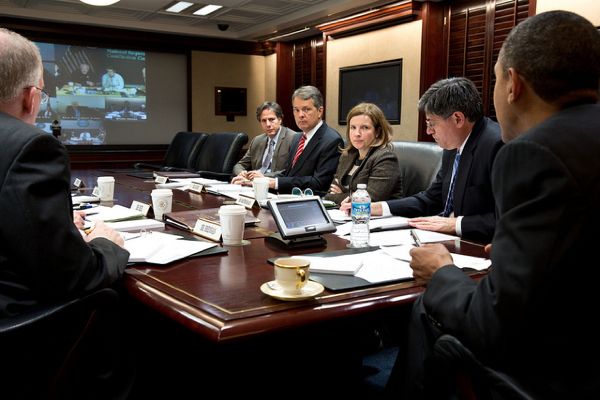A Presidential Response to Hurricane Sandy

After Hurricane Sandy devastated the East Coast, the presidential candidates took the opportunity to exercise the presidential tradition of addressing the masses, ensuring victims of a secure future, and offering humanitarian aide.
The aftermath of the superstorm proves to be a prime opportunity for candidates to emphasize a more genial, non-policy focused persona. Governor Romney has the ability to play up his connection to the "everyman" and not the billionaire. It is a facet of the governor's life that has been largely criticized, especially in an economic downturn. Obama on the other hand, touts his experience as a leader, presenting himself as calm and collected; the guy who knows what to do.
The campaign trail itself has already been interrupted by Hurricane Sandy, voiding about three days of campaigning for both Republican and Democratic candidates. Nevertheless, Sandy proves ideal for proving candidates can stand the pressure of unexpected disasters, if elected.
Barack Obama was the first to respond, cancelling his Florida rally. As the current president, this quick response is understandable, if not expected. The spotlight is more focused on Obama than the other presidential candidates.
In a statement released following the cancellation, Obama said, “The election will take care of itself next week. Right now our number one priority is to make sure that we are saving lives." Instead, he has been urging citizens to donate funds to Red Cross. The organization is supporting victims of the hurricane.
Not to be overshadowed, the Romney campaign suspended campaign donations in hurricane-affected states. Romney organized a food and supply drive in Ohio, during which he urged citizens to support the aide of hurricane victims on the nation’s East Coast.
This is undeniably a prime opportunity for the Republican candidate to empathize with those afflicted by the hurricane, rather than corporate interests and wealthier citizens. Pictures of Mitt Romney handing out food and water supplies have been widespread across the Internet, aiding to the idea that he readily supports the everyman.
The most surprising turn of events from the hurricane have undoubtedly been those effecting Dr. Jill Stein’s campaign for the presidency. Stein was arrested on Halloween morning for bringing food and supplies to eco-activists who were boycotting the expansion of the Keystone XL pipeline in Texas.
“Everyone needs to step up resistance to climate-killing emissions,” said Stein going even further to state, “Romney and Obama are only talking about the symptoms of climate change in terms of destruction caused by Hurricane Sandy; the blockaders are addressing the cause.” Stein’s response to the hurricane, unlike bipartisan candidates, reflects her ongoing pleas for green solutions and environmental responsibility.
Hurricane Sandy has allowed candidates of all parties to emphasize the strong points of their campaign. Obama has been able to highlight his experience in trying times, while Romney has used the natural disaster to prove his likeness to the average American. Jill Stein, on the hand, has been able to relate the hurricane to the actual issues relevant to her campaign, specifically regarding her fervent stances on the environment and abuse of natural resources.




